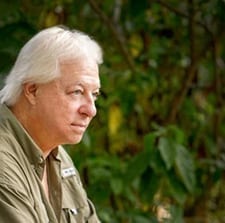The Relentless Grind
November 17, 2022By Tom Poland
Football’s Hidden Injuries
Winter Haven Florida, February 1996—I covered Cypress Gardens’ 60th anniversary for Ski World magazine. It was Florida’s oldest theme park, one where Southern belles wore hoop skirts, skiers leapt from ramps, and women skiers built pyramids upon each other’s shoulders.
After three days with professional water skiers, Robert Clark, photographer, and I had wrapped things up and were driving along Interstate 4 when the radio crackled. It was about a coach at Georgia under Vince Dooley and Ray Goff. Wayne McDuffie lived in Tallahassee, where he had once been a vital cog in the Florida State Seminole machine.
Coaching—There’s the pressure of not winning and there’s the pressure of forever looking for work. In Sporting News, August 1996, Bill Minutaglio wrote “The Coach, The Players, Their Demons,” a heartbreaking piece on how McDuffie’s life spiraled down after the Ray Goff era ended.
1994, McDuffie—“I really thought I wouldn’t survive this year. I’m so exhausted from trying to put pieces together that don’t fit. I’m trying to make something from nothing. I really thought I would die. I thought I would have a heart attack and die because I worked so hard. I worried so much and tried so desperately to hold this thing together.”
The team had a disastrous season. The Bulldogs went 6-4-1.”
The relentless grind takes a toll on many coaches, and when that perfection doesn’t materialize in the won-loss record, it does their family few favors. The ex wife of a former college coach told me she divorced her husband because she could not take the fan abuse.
“I couldn’t go the grocery store or the hair salon without strangers walking up and criticizing my husband. I couldn’t go anywhere without being harassed. It just got to be too much.”
Minutaglio—“Sometimes, assistant coaches at Florida State, where Wayne coached for most of the 1980s, would hear a strange flapping sound from one of the offices. It could be 6 a.m. or even 5 a.m. As they held their cups of coffee and looked inside, there would be Wayne McDuffie asleep on a conference table, his Clint Eastwood face and body oddly illuminated by the flickering light … When someone woke him up, he would simply, wordlessly, move to the football field where he had ordered his offensive lineman to show up before sunrise.”
People love to gripe about coaches’ salaries. The coaches can never do enough. If their team goes undefeated, then it must do so forever. Over the message boards, over sports talk radio, and in the stands, guys play armchair quarterback as if they had coached a few national championships. Many never played a down of football, yet they think they know more than the coaches.
From 1989 to 1995, six wins a season did Goff in and with him went the coaching staff. “McDuffie watched members of the old staff move on to other jobs. Wayne jogged in his golf-course neighborhood, pushing himself hard. He lifted weights. And, with his wife, he wrestled with plans for the future. He hoped a professional team would come calling. Football was all Wayne McDuffie had known. He was out of work and the offers he thought that would come? His phone never rang.
“His birthday, December 1, and the holidays passed, as did the big bowl games, the pro playoffs and the Super Bowl, and Wayne McDuffie still was unemployed. The chart, the map, had led nowhere.”
That crackling radio … At the age of 51, Wayne McDuffie had killed himself.
Letters and praise poured in. A former player said he “couldn’t stop thinking of Coach McDuffie, of the imposing figure he cut between the green grass and blue sky, of the wonderful way he affected my life.”
He left behind three kids and his wife of 26 years.
Visit my website at www.tompoland.net
Email me at [email protected]






















